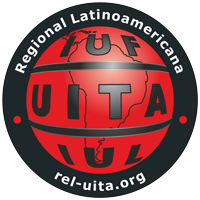On the third anniversary of the coup
Thursday, February 1, 2024, marks the third anniversary of the military coup in Myanmar and the brutal repression it unleashed, which has seen thousands killed or arrested, including a large number of trade union members. Right from the start, the Latin American Regional Office of the IUF (UITA) has stood by our Burmese brothers and sisters and the Asia-Pacific regional office of our international federation, supporting them in their struggle.
Gerardo Iglesias
1 | 2 | 2024

Illustratrion:: UITA Asia-Pacífico
“Despite international efforts, the military State Administration Council (SAC) remains in power and continues its brutal repression and violence against the people of Myanmar,” Asia-Pacific Regional Secretary Hidayat Greenfield, writes in a letter to us.
The crackdown on the democratic movement following the coup that brought General Min Aung Hlaing to power has thus far resulted in 3,353 people murdered, including 547 children.
To date, some 25,915 women and men have been arrested for their involvement in the Civil Disobedience Movement (CDM), including hundreds of trade unionists and labor activists.
Of these—Hidayat informs us—19,977 remain in detention including 710 children.
In its brutal repression of the democratic movement, the State Administration Council (SAC) has killed a total of 4,453 civilians, of whom 547 are children.
“The People’s Defence Forces (PDF) under the National Unity Government (NUG) and allied armed forces of ethnic groups fighting the SAC continue to liberate hundreds of towns and villages from military control,” Hidayat notes.
That advance has led to the government being questioned even within its own ranks.
“Military control has also been weakened by mass surrender and desertion of soldiers. The military SAC government is both vulnerable to military defeat and extremely desperate. The SAC has increased its aerial bombardment of towns and villages,” our fellow unionist notes.
“More than 2.5 million civilians have been displaced due to artillery bombardment and aerial strikes, including hundreds of members of AFFM [Agriculture and Farmers Federation of Myanmar] and their families.”
“We can only achieve peace and restore democracy through the total and complete isolation of the military SAC government and full international recognition of NUG,” Hidayat underlines.
The Sixteenth Latin American Regional Conference of the IUF, held last year in São Paulo, adopted a resolution in support of “the people of Myanmar in their struggle for democracy,” and all the trade unions members of the Regional Office have sent messages of solidarity with our Burmese brothers and sisters.
“What must the United Nations do now? Recognize the democratic government of Myanmar,” the campaign’s slogan said.
The text of the São Paulo Conference resolution recalled that the armed forces that staged the coup d’état justified their actions claiming they were “‘a means necessary to pave the road to a genuine, multi-party democracy,’ echoing arguments we have heard time and time again from the mouths of coupist officers in Latin America.”
“We do not forget the expressions of international democratic solidarity we received from other peoples, some of them geographically distant but very close to our struggles” in those dark times, it added.And it concluded that “such displays of solidarity are not to be thanked, but must be reciprocated through our own solidarity with those who now face authoritarian contexts.”
The resolution quoted, in this sense, a phrase by Jair Krischke, president of the Brazilian Movement for Justice and Human Rights (MJDH) and advisor to Rel UITA (IUF Latin America): “human rights must be defended at all times and in all places.”
